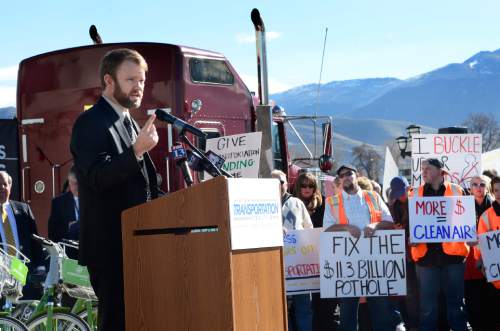This is an archived article that was published on sltrib.com in 2015, and information in the article may be outdated. It is provided only for personal research purposes and may not be reprinted.
Just before its midnight adjournment, the Legislature passed a compromise plan Thursday to raise and reform gasoline taxes for the first time in 18 years — merging what had been competing proposals by the House and Senate.
The deal includes raising the gas tax by about 5 cents a gallon on Jan. 1, 2016. The Senate earlier sought a 10 cent increase, while the House initially wanted no hike.
The compromise adopts a House proposal to convert the current cents-per-gallon gas tax into a system similar to a sales tax. That allows the tax collected at the pump to increase automatically when gas prices rise.
The deal would impose a 12 percent tax on the wholesale price of gasoline, adjusted once a year.
However, Rep. Johnny Anderson, R-Taylorsville, said the bill is written so that automatic raises are designed not to kick in until the wholesale price of gasoline reaches $2.45 a gallon, which is not projected to happen for six to 10 years.
The deal has a cap to ensure the gas tax does not rise above 40 cents a gallon over time.
The Senate also gave in to what had been a sticking point with the House — allowing counties to ask voters to approve a quarter-cent per dollar sales tax increase to give cities, counties and transit districts more money for local projects.
In urban areas, cities and the Utah Transit Authority would each receive a tenth-cent of the sales tax increase, and counties would receive .05 of a cent.
The Senate also removed proposed increases in car registration fees that the House opposed.
The Senate approved the compromise 20-8, and the House approved it 44-29.
Gov. Gary Herbert has supported the approach taken by the compromise, indicating he would likely sign it if it passes.
"Having a five cent increase in gasoline tax so we can have some instant infusion of money into our needs for roads is a good thing," he said this week. "Having a sales tax that will grow as we have an expansion in the economy to address our growth pressures is also a good thing."
Lawmakers also killed this week a proposal to raise vehicle registration fees to raise money for roads. It initially proposed to hike the yearly registration fee at least $10 for any car, but fees for some alternative-fuel cars would have skyrocketed by as much as $70 annually.
In other transportation topics, the Legislature passed a bill to toughen seat belt enforcement.
HB79 makes failure to wear a seat belt a primary offense, meaning officers could stop and cite people directly for the lapse. Currently, Utah has a "secondary" law for those 18 and older. A $45 ticket can be issued only when an officer stops a vehicle for another reason.
It also passed a bill to allow people to travel through railroad crossings as soon as guard gates rise, instead of waiting for all flashing lights to stop — a practice that the Utah Transit Authority has warned could be deadly.
But dying late Thursday was HB67, which would have allowed one-touch use of hand-held cellphones while driving, but would ban holding a phone up to the ear of the driver.



